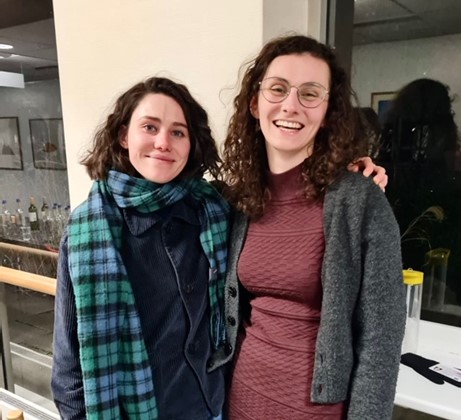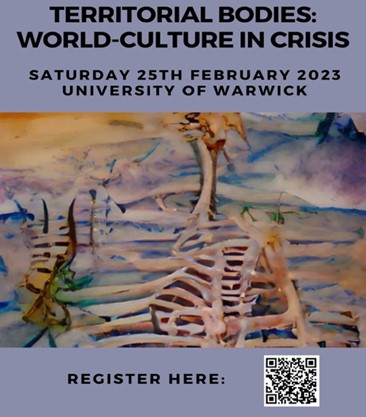All entries for Wednesday 17 May 2023
May 17, 2023
Why post–war homecoming (also) belongs with the humanities
Writing about web page https://warwick.ac.uk/fac/arts/hrc/confs/homecoming/
The post-war as conceptual framework has, at least since 1989, belonged firmly in the social sciences. An inter-disciplinary academic cottage industry emerged as waves of democratisation and ethnic conflict engrossed globalised audiences of scholars and practitioners. Sociologists, political scientists, economists, and a smattering of anthropologists, well-funded by the United Nations and myriad global institutes, invented the field of ‘transition’ or ‘peace studies’. At its heart is the triad ‘disarmament, demobilisation, and reintegration’ (DDR) which is to take place in each post-conflict situation, from Rwanda, to Cambodia, to the former Yugoslavia. This portion of ‘transition studies’ focusses on ex-combatants and their communities in particular, centring on their ‘homecoming’ after a period of violent conflict. These studies primarily seek to plan for, and analyse existing, programmes that are supposed to neuter ex-combatants and thereby stop them from being a threat to a post-war peace settlement. Hereby, unfortunately, ‘homecoming’ is viewed as a technical problem which requires satisfactory resolution.
Alongside reducing complex situations to a series of structural laws (accompanied by a bevy of diagrams), there is the unfortunate effect in DDR studies of treating ex-combatants as a-historical, a-politicised actors. As Jaremey McMullin points out, this is also a particular result of a racial bias. While Euro-American veterans are portrayed as positive social actors who represent a reminder of a nation’s duty in the ‘homes fit for heroes' mould,ex-combatants in the Global South are a security threat who need to be ‘civilianised’ and pose a threat due to their acquired habitus of violence.[1] DDR’s focus on the latter means a unfortunate lack of dialogue between the West’s own experience of Homecoming and experiences elsewhere. Homecoming has been happening in the Global South for as long as it has elsewhere, with every community having its own rituals of return and closure. Even if we do consider the dangers of post-homecoming remilitarisation, as one would say in the Eastern Congo today, would not Germany’s Freikorps or the US South’s Ku Klux Klan provide just as fruitful a comparison? On the other side of the ledger, trans-historical comparisons could fruitfully be made between rituals of closure: from indigenous Americans ‘burying the hatchet’ to contemporary homecoming videos of US Army personnel service personnel serving overseas.
For historians the ‘post-war’ represents that era which followed the tumult of 1939-1945, so masterfully captured in the (albeit Eurocentric) work of Tony Judt.[2] However, loaded in this term is the crucial assumption that we in Europe live in a world indelibly marked by the after-effects of war. Europeans continue to live in the world of May 1945, albeit modified by November 1989. This conceptual importance granted to the ‘post-war’, I believe forces historians and other scholars in the humanities to re-occupy the space yielded to the social scientists of the DDR school. In particular, this applies to the precise moment of ‘homecoming’, the essential crucible in which the post-war is forged. Nathalie Duclos for one has criticised the conceptual gap between historical work on returning veterans in post-World War Europe and North America, and post-1989 DDR work.[3]
This appeal is for far more than merely history. Literary, art, film and theatre studies, classics, and philosophy all have their place. Kate McLoughlin (keynote speaker at the Homecoming conference), starting with Homer and Xenophon, and going on to discuss the British post-Napoleonic canon, has masterfully indicated the significance of the figure of the veteran for understandings of European modernity.[4] The root of the question is what homecoming does and says about human subjectivity, which is crucially what the humanities must contribute to the academy as a whole. The anthropologist Kimberly Theidon, working on the aftermath of Peruvian Maoist insurgency, reminds us that while many social scientists employ a global hegemonic discourse of trauma or PTSD, we need to understand ‘locally salient theories of illness, health, agency, and social repair’.[5] War, in general, is a moment of extreme discombobulation. New identities are adopted, minds and communities are shattered by loss and experiences of extreme violence. Masculinities, femininities, and the boundaries of communities are all reshaped and require sustained academic attention. Efforts to try and rebuild a sense of ‘normality’ from this psychological and physical wreckage are not easily captured by terms like ‘civilianisation’, reconstruction, or demilitarisation, which are favourites of DDR scholars. It is up to scholars in the humanities to critique and dissect such concepts which remain tied to normative frameworks associated with the post-1989 transitions.
1 Jaremey R. McMullin, Ex-Combatants and the Post-Conflict State: Challenges of Reintegration (Houndmills: Palgrave Macmillan, 2013). 2 Tony Judt, Postwar: A History of Europe Since 1945 (London: Penguin, 2005). 3 Nathalie Duclos, War Veterans in Postwar Situations: Chechnya, Serbia, Turkey, Peru, and Côte D’ivoire (Basingstoke: Palgrave Macmillan, 2012). 4 Kate McLoughlin, Veteran Poetics: British Literature in the Age of Mass Warfare, 1790-2015 (Cambridge: Cambridge University Press, 2018). 5 Kimberly Theidon, Intimate Enemies: Violence and Reconciliation in Peru (Philadelphia: University of Pennsylvania Press, 2013).
A Conversation between the Conference Organisers: On the Day
Writing about web page https://warwick.ac.uk/fac/arts/hrc/confs/territorialbodies/
In this blog post, Charlotte, Lizzie Smith (a PhD student and conference participant)and Maddie reflect on running the conference Territorial Bodies: World Culture in Crisis, which took place in February 2023.
Charlotte: Territorial Bodies 2023: where to start?
Maddie: We arrived at Warwick University’s Humanities building, alongside our team of helpers, Mohammad, Owain, Tara and Giulia. From the outset, delegates engaged in dynamic conversation. There was a genuine atmosphere of warmth.
Charlotte: Lauren’s keynote was such a great way to start the day. She really opened up the questions that then informed discussions throughout the conference.
Lizzie: it was so great to hear from academics so established in their fields!
Maddie: The panels were interdisciplinary in nature, so we were quite intrigued to see how the sessions would unfold. The first two panels – “Embodied Extractivism” and “Aquatic bodies” - featured such fascinating papers.
Lizzie: As an attendee, there was a buzz surrounding which panel to choose, because they all contained elements to spark the imagination. I’m sure I wasn’t the only one who wanted to be in two places at once.
Charlotte: Yes, I had the same experience. In the second session, I attended the “Gender Bodies, Space” panel and I was blown away by the level and quality of research presented, as well as the importance of that research in impacting the everyday lives of so many people.
Maddie: The conversations continued over lunch, and it was great to see people sharing ideas in a collaborative way.
Lizzie: Yes, that’s a real benefit of the in-person conference and something we’ve all missed. 
Charlotte: I agree. As the day went on and we ironed out some of the initial teething issues, it was great to be able to relax into those conversations. By the third session after lunch, I was fully immersed in the exciting discussions being presented.
Maddie: I particularly enjoyed listening to discussions taking place between people at different stages in their career, especially during the third series of panels, “Bodies and Accumulation” and “Embodied Displacement”.
Charlotte: You’re absolutely right, plus in the final session, the panel I attended had speakers from such varying disciplines, but the chair did such a great job of bringing that conversation into an interesting and creative discussion.
Maddie: For me, a real standout moment was during the Q&A following Kathryn’s keynote address at the end of the day.
Charlotte: Yes! One delegate asked about the importance of breaking down traditional academic silos and recommendations for students in the early stages of their career looking to do the same. Kathryn spoke about who benefits from maintaining traditional academic silos, and who might benefit from breaking away from them.

 Sue Rae
Sue Rae

 Please wait - comments are loading
Please wait - comments are loading
 Loading…
Loading…